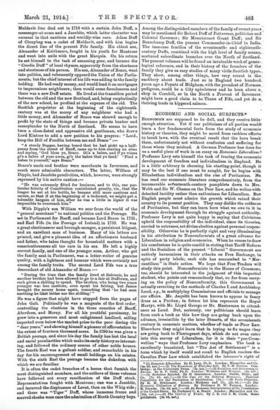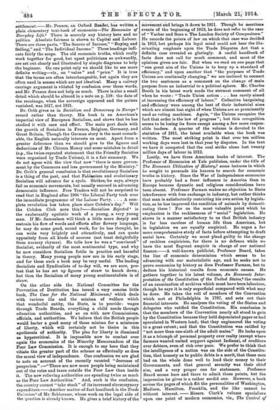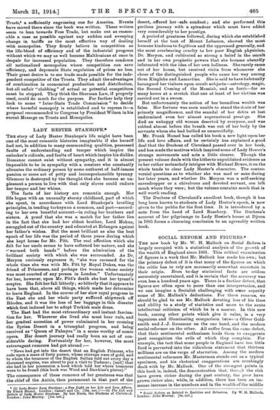ECONOMIC AND SOCIAL SUBJECTS.*
ECON031 ICS are supposed to be dull, and they receive little enough attention. Yet if our politicians of all parties would, learn a few fundamental facts from the study of economic history or theories, they might be saved from reckless efforts. to break laws, with the eventual result that the laws break them, unfortunately not without confusion and suffering for those whom they mislead. A German Professor has done for us a useful piece of work in an essay on Economia Liberaliankb Professor Levy sets himself the task of tracing the econoinis development of freedom and individualism in England. He is a little arbitrary in choosing his starting-point, though it may be the best if one must be sought, for-be begins with Elizabethan individualism and the rise of Puritanism. He has read our economic literature comprehensively, from the' innumerable sefenteenbh-century pamphlets down to Mts. Webb and Sir W. Chance on the Poor Law, and-be-writes-with detached lucidity rather than enthusiasm for Liberalism. Butt English people must admire the growth which raised theie country to its present position. They may dislike-the coldness of Puritanism, but they can learn here what we owe to it in economic development through its struggle against authority. Professor Levy is not quite happy in saying that Calvinism, upheld the responsibility- of the individual, since its theories, carried to extremes, set divine election against personal respon: sibility. Otherwise he is perfectly right and very illuminating in his attribution to Nonconformists of a great advance for Liberalism in religion and economics. When he comes to draw his conclusions he is quite candid in stating that Tariff-Reform and the Socialism of the present "Liberal" Government are entirely harmonious in their attacks on Free Exchange, in spite of party labels; each side has succumbed to " Mel, cantiliam " in State action. We hope that Free Traders will study this point Nonconformists in the House of Commons, too, should be interested in the judgment of this impartial student, who points on.e remomelessly that, so farirom carry- ing on the policy of Nonconformity, this Government is actually reverting to the methods of Charles L and Archbishop Laud, e.g., in multiplying- Commissions- and officials to manage our affairs. Mr. Asquith bas been known to appear in fancy dress as a Puritan; in future let him represent the Royal Martyr, with Mr. Lloyd George or Mr. Masterman in attend- ance as Laud. But, seriously, our politicians should learn from such a book as this how they are going back upon the advance, irresistible by the later Stuarts, of the seventeenth century in economic matters, whether of trade or-Poor Law. Elsewhere they might learn that in trying- to fix wages -they are going back to Plantagenet days, which do not even enter into this survey of Liberalism; for it is their " pee-Croon- wellian " ways that Professor Levy emphasizes. The book is excellently translated, but "The Act of Settlement" is a term which by itself would not recall to English readers the Caroline Poor Law which established the labourer's right of • (1)..Boonomfe _Wore/ism By H. Item Ph.D. Londqu: Macmillan and Co. 14s. 05, net.1—(s) The Economics of Poot;lay Life, By T. H. Benson. WU- baidy*: at the UlliTeraltr 33tatit •-•-•-(3). SoSiatinn.ead Pneesirsolf in Europe. By S. P. Orth, Ph.D. London: Shams and Norma,. Eider, negt,i4 Co ttee for the Prevention of Destitution. [1..]—(6) Trade Unionism. Befectocl. By B. Samuelson. London: Smith. —(4) Soeiaiis,n Co. 7a. 6d. net.]—(5) The Caw Jar the National Ifin4nIon. Naional By H. H. Sohloesser. London: Methuen sad Co. [ga. 51.]—(7). Economic UtSitation of History. By Professor H. W. Foram. London: H. Provide. [5s. 65. net..)—(8) Is Boonontio interpretation-00u Constitution silt. United States. By Professor C. 4.. Beard. London ltacmillan end Co. [10s. ret.3—(9) The Control of Trusts. By J. B. and J. Id. Clark. Fame sattlement.—Mr. Poison, an Oxford ;Reader, has written a plain elementary text-book of economics—The Economies of Everyday Life.* There is scarcely any history here and no politics. Absolute fairness is shown to Capital and Labour. There are three parts, "The Source of Income," "Buying and Selling," and "The Individual Income." These headings indi- cate fairly the scope. The old economic truths, which really work together for good, but upset politicians so awkwardly, are set out clearly and illustrated by simple diagrams to help the beginner. On one point only we should like to see more definite writing—vii, on " value " and "price." It is true -that the terms are often interchangeable, but again they are -often used in senses which are not identical Many a railway -carriage argument is vitiated by confusion over these words, and Mr. Penson does not help as much. There is also a small detail which should be altered in a note on p. 118: the date of the recoinage, when the sovereign appeared and the guinea vanished, was 1817, not 1821.
Dr. Orth gives us in Socialism and Democracy in Europe 3 record rather than theory. His book is an American's impartial view of European Socialism, and shows that he has studied it with care and effect. The main part deals with the growth of Socialism in France, Belgium, Germany, and Great Britain. Though the German story is the most remark- able, the English naturally interests us most. Apart from a greater deference than we should give to the figures and deductions of Mr. Chiozza Money and some mistakes in detail (e.g., the twice-repeated statement that the Friendly Societies were organized by Trade Unions), it is a fair summary. We do not agree with the view that now "there is more govern- ment by the Commons and less government by the Ministry." Dr. Orth's general conclusion is that revolutionary Socialism is a thing of the past, and that Fabianism and evolutionary Socialism will advance for a cycle. Strikevhe says, always fail as economic movements, but usually succeed in advancing democratic influence. Free Traders will not be surprised to read that in England after 1906 "the Liberal Party took over the immediate programme of the Labour Party. . . . A com- plete revolution has taken place since Cobden's day." Will the Cobden Club note this ?—Socialism Rejected is the exuberantly egotistic work of a young, a very young man. If Mr. Samuelson will think a little more deeply and restrain his flow of words and efforts after flowery language, he may do some good, sound work, for be has thought, he can write very brightly and attractively, and can quote appositely from all kinds of sources (not least delightfully from nursery rhymes). He tells how he was a "convinced" Socialist, evidently of the most sentimental type, and why he now considers Socialism futile in practice and harmful in theory. Many young people now are in his early stage, and for them such a book may be very useful. The leading Socialists and Syndicalista of to-day will, we are sure, pro- test that he has set up figures of straw to knock down; but then the Socialism of many young sentimentalists is of straw.
On the other side the National Committee for the Prevention of Destitution has issued a very concise little book, . The Case for the National .Minimum,' which deals with various ills and the minima of welfare which that wonderful entity, the State, is to provide: wages through Trade Boards, everything a child needs through education authorities, and so on with new Commissions, officials, and authorities. We believe that the British people would barter a good many of these minima for a minimum of liberty, which will certainly not be theirs in this apotheosis of authority. The plea for liberty is dismissed as hypercritical. It is impossible now to combat over again the economics of the Minority Memorandum of the Poor Law Commission. It is enough to say here that they vitiate the greater part of the scheme as effectually as does the moral view of independence. One confession we are glad to note on account of the recently vaunted "decrease of pauperism" :—" There are now more people being maintained out of the rates and taxes outside the Poor Law than inside it. The new relieving authorities are spending twice as much as the Poor Law Authorities." And, such is the confusion, the country cannot "take stock" of its increased eleemosynary expenditure—Another matter-of-fact handbook is the Trade Unionism' of Mr. Schloesser, whose work on the legal side of the question is already known. He gives a brief history of the MOvement'and brings it down-to 1911. Though he mentions events of the beginning of 1913, he does not refet to the ease of " Vacher and Sons v. The London Society of Compositors." He records the points of law on which that case was decided in 1912, but perhaps his legal mind could not bear the illu- minating emphasis upon the Trade Disputes Act that a definite case revealed so glaringly. A useful handbook of facts does not call for much comment, and most of the opinions given are fair. But when we read on one page that "one great aim of the Unions is to keep up a Standard of efficiency," and upon another that "the purposes of Trade Unions are continually changing," we are inclined to connect the two sentences as a comment on the change of main purpose from an industrial to a political sphere. ' Mr. Charles Booth in his latest work made the sternest comment of all when he wrote : "Trade Union action . . . has rarely aimed at increasing the efficiency of labour." Collective bargaining and efficiency were among the beat of their industrial aims which are almost lost sight of when Unions are so prominently used as voting machines. Again, "the Unions recognize the fact that order is the law of progress"; but this recognition seems to be losing its force except among a few more respon- sible leaders. A quarter of the volume is devoted to the statistics of 1911, the latest available when the book was written. The most striking point is that over ten million working days were lost in that year by disputes. In the text we have it computed that the coal strike alone lost twenty million days of labour in 1912.
Lastly, we have three American books of interest. The Professor of Economics at Yale publishes, under the title of The Economic Utilization of History? some lectures in which he sought to persuade his hearers to search for economic truths in history. Since the War of Independence economics have probably had a freer influence in America than in Europe because dynastic and religious considerations have been absent. Professor Farnam makes no objection to State interference with free exchange in industry, but rather thinks that man is satisfactorily restricting his own action by legisla- tion, as he has improved the condition of animals by domesti- cating them ! For us the most valuable point which be emphasizes is the recklessness of "social" legislation. lie shows in a manner satisfactory to us that British industry is far less careless of human life than American, but in legislation we are equally empirical He urges a far more comprehensive study of facts before attempting to draft social laws. Certainly we must plead guilty to the charge of reckless empiricism, for there is no defence while we have the most flagrant empiric in charge of our national finance.—A well-known publicist, Professor Beard, takes the line of economic determinism which seems to be advancing with our materialistic age, and be seeks not to prove economics by history as does Professor Farnam, but to deduce his historical results from economic causes. He gathers together in his latest volume, An Economic Inter- pretation of the Constitution of the United States,' the results of an examination of archives which must have been laborious, though he says it is only superficial compared with what may be done. He takes the roll of members of the Convention which met at Philadelphia in 1787, and sets out their financial interests. He analyses the voting of the States and delegates who ratified the Constitution. His conclusion is that the members of the Convention nearly all stood to gain by the Constitution because they held depreciated paper or had speculated in Western land; that they engineered the voting to a great extent, and that the Constitution was ratified by "not more than one-sixth of the adult males." He looks upon it as a triumph of personal property over realty (except where farmers wanted united support against Indians), of creditors over debtors, even of rich over poor. We prefer to think that the intelligence of a nation was on the side of the Constitu- tion, that honesty as to public debts is a merit, that these men had on the whole done well to lend their money to their Governments, and that general security was their chief aim, and a very proper one for statesmen. Professor Beard seems here and there to admit these points, but the impression he gives is a rather sordid one. However, a book across the pages of which flit the personalities of Washington, Madison, Hamilton, Franklin, and the like cannot be without interest. — Messrs. Clark's volume specializes upon one point of modern economics, viz., The Control of
Trusts,' a sufficiently engressing one for Ameriea. Events have Moved there since the book was written. These writers seem to lean towards Free Trade, but make out as reason- chi° a case as possible against any sudden and sweeping change in tariffs as the most effective way of dealing with monopolies. They firmly believe in competition as the life-blood of efficieney and of the industrial progress without which we may as well become Malthusians at once in -despair for increased population. They therefore condemn all nationalized monopolies where competition can save -efficiency, and deprecate State regulation of prices no less. Their great desire is to see trade made possible for the inde- pendent competitor of the Trusts. They admit the advantages of combination in economical production and distribution, but all unfair "clubbing" of actual or potential competitors must be stopped. They think the Sherman Law, if properly afsed, could do much for the purpose. For further help they look to some " Inter-State Trade Commission" to decide where harmful monopoly is established and to repress it—a proposal recommended to Congress by President Wilson in his recent Message on Trusts and Monopolies.












































 Previous page
Previous page